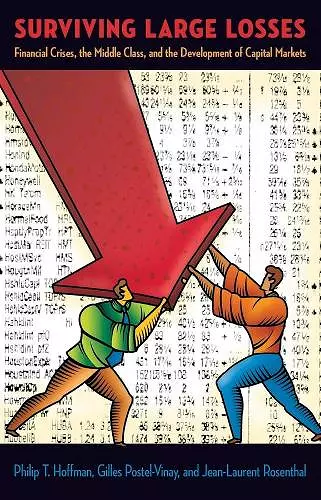Surviving Large Losses
Financial Crises, the Middle Class, and the Development of Capital Markets
Philip T Hoffman author Jean-Laurent Rosenthal author Gilles Postel-Vinay author
Format:Paperback
Publisher:Harvard University Press
Published:14th Nov '09
Currently unavailable, and unfortunately no date known when it will be back

The authors are highly respected economic historians whose deep command of the specialist literature shines through. Their ideas are clearly presented, and effectively harness historical example to address one of the great questions of this age: why are some economies successful, and others not? Their answer will command attention among policy makers and scholars alike. -- Stephan R. Epstein, London School of Economics The authors mobilize their impressive knowledge of economic history to examine contemporary issues of policy and theory. The result is an outstanding volume, richly rewarding to people in several different disciplines. -- Peter Gourevitch, University of California, San Diego The authors' approach is open and accessible to general readers. The text is not bogged down with economic theory or arcana, while still presenting important and fundamental economic concepts in an understandable fashion. The book also addresses head-on the challenge of providing a political economy model of the interaction of politics and economics. It is to be strongly recommended. -- John Joseph Wallis, University of Maryland Surviving Large Losses is an extremely learned book, one that draws on the authors' deep knowledge of economics and history. It ranges across the history of Western Europe, the United States, Korea, Japan, China, and Latin America--and it does so with elegance. It develops, in a language accessible to non-specialists, models about complicated topics in economic theory. -- Stephen Haber, Stanford University
When financial institutions collapse, new ones take their place, shaping markets for generations to come. This book explains why financial crises occur, why their effects last so long, and what political and economic conditions can help countries both rich and poor survive, and even prosper, in the aftermath.
Listen to a short interview with Philip T. HoffmanHost: Chris Gondek | Producer: Heron & Crane
Financial disasters often have long-range institutional consequences. When financial institutions--banks, insurance companies, brokerage firms, stock exchanges--collapse, new ones take their place, and these changes shape markets for decades or even generations. Surviving Large Losses explains why such financial crises occur, why their effects last so long, and what political and economic conditions can help countries both rich and poor survive--and even prosper--in the aftermath.Looking at past and more recent financial disasters through the lens of political economy, the authors identify three factors critical to the development of financial institutions: the level of government debt, the size of the middle class, and the quality of information that is available to participants in financial transactions. They seek to find out when these factors promote financial development and mitigate the effects of financial crises and when they exacerbate them.Although there is no panacea for crises--no one set of institutions that will resolve them--it is possible, the authors argue, to strengthen existing financial institutions, to encourage economic growth, and to limit the harm that future catastrophes can do.
The authors are highly respected economic historians whose deep command of the specialist literature shines through. Their ideas are clearly presented, and effectively harness historical example to address one of the great questions of this age: why are some economies successful, and others not? Their answer will command attention among policy makers and scholars alike. -- Stephan R. Epstein, London School of Economics
The authors mobilize their impressive knowledge of economic history to examine contemporary issues of policy and theory. The result is an outstanding volume, richly rewarding to people in several different disciplines. -- Peter Gourevitch, University of California, San Diego
The authors' approach is open and accessible to general readers. The text is not bogged down with economic theory or arcana, while still presenting important and fundamental economic concepts in an understandable fashion. The book also addresses head-on the challenge of providing a political economy model of the interaction of politics and economics. It is to be strongly recommended. -- John Joseph Wallis, University of Maryland
Surviving Large Losses is an extremely learned book, one that draws on the authors' deep knowledge of economics and history. It ranges across the history of Western Europe, the United States, Korea, Japan, China, and Latin America--and it does so with elegance. It develops, in a language accessible to non-specialists, models about complicated topics in economic theory. -- Stephen Haber, Stanford University
The excitement of Surviving Large Losses is not easy to convey. It is a different kind of thinking cap, that's all. On every page it reflects the substantial changes wrought by political economists during the past thirty years or so in the way we understand the sources of the wealth and poverty of nations. It delivers a profoundly optimistic message, however--that eventually we get wise to ourselves; that gradually financial knavery is reduced; that by learning from our mistakes we are creating a more stable financial order, and perhaps even a more just world. -- David Warsh * Economicprincipals.com *
The authors of this book, academics in the fields of history, social sciences, and economics, have done more than write a history of financial crises; rather, they explain the nature of these crises by putting economic theory into plain English. -- R. J. Phillips * Choice *
This is a timely book. It is also provocative in trying to do something no one has done before, namely provide a comprehensive political economy analysis of several centuries of financial crises and their effects on the development of financial systems. It aims to bridge the gap between the modern economics literature on finance and growth, and more traditional historical studies...Surviving Large Losses is a step forward in the social-scientific analysis of financial crises and historical financial development. -- Richard Sylla * Journal of Economic History *
- Nominated for Allan Sharlin Memorial Award 2008
ISBN: 9780674036369
Dimensions: unknown
Weight: unknown
272 pages